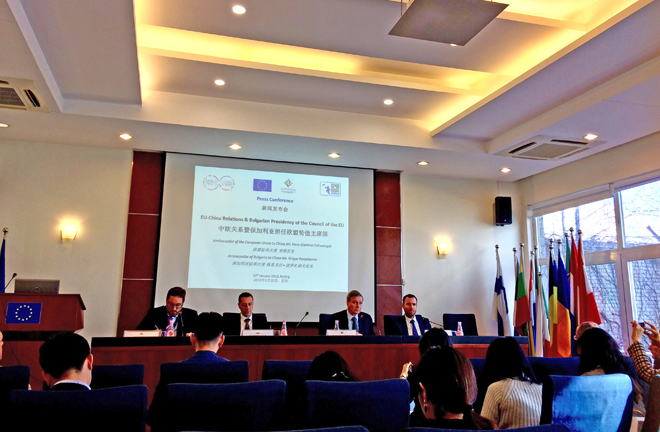EU to cooperate more with B&R in improving connectivity

EU Ambassador to China Hans Dietmar Schweisgut (2nd right) and Bulgarian Ambassador to China Grigor Porozhanov (3rd right) held a press conference in Beijing on Jan. 10. (PHOTO: CSST)
On Jan. 10, EU Ambassador to China Hans Dietmar Schweisgut and Bulgarian Ambassador to China Grigor Porozhanov held a press conference in Beijing to update the media on all areas of EU-China relations and lay out the priorities for the Bulgarian Presidency of the European Council in the first half of 2018.
The ambassadors expressed optimism about the European Union’s development in 2018. They said that the European Union is expecting a stronger economic recovery. The bloc resolves to consolidate integration at all levels and will continue to play an important role on the world stage.
Porozhanov said the European Union has economic growth momentum, but it also faces many challenges. He listed the three priorities of the European Union: security, solidarity and stability. To achieve these goals the European Union needs to work on consensus, competition and cohesion. He said that during its presidency, Bulgaria will especially focus on balancing the concrete needs of the member countries with the European Union’s strategic demands, offering member countries a safe environment and more employment opportunities while enhancing the internal unity of the member countries and cooperation among different EU institutions.
Schweisgut said 2018 is expected to be a good year for EU-China relations. He cited the recent state visit to China of French President Emmanuel Macron, who not only represents France but also is a strong voice in the EU. The year 2018 marks the 15th anniversary of the establishment of the China-EU strategic partnership. Over the years, the bilateral relationship has developed into a strong partnership in various fields, including politics, security, peacekeeping as well as tackling regional crises. While the European Union and China have different political systems, views on how to organize societies and approaches to economic governance, both sides are committed to finding solutions to global problems together.
Schweisgut said the European Union is looking forward in 2018 to deepening cooperation with China on connectivity. The European Union views this as conducive to the prosperity of the Eurasian region. With all the efforts made before, including the seventh EU-China Summit, held in 2015, and the Belt and Road Forum for International Cooperation in 2017, the European Union is now working on its own blueprint for Eurasian connectivity, which will be drafted later this year. This blueprint will seek synergy between the European connectivity programs and China’s “Belt and Road” initiative. On this basis, the European Union will have a solid and strong framework to improve cooperation with China and other countries in the Eurasian region.
Schweisgut also stressed that this cooperation should be a two-way street. The year 2018 is also the 40th anniversary of China’s reform and opening up. Thanks to this policy, China has made great progress toward prosperity and development. The European Union hopes China further will improve its market access, allowing foreign countries to benefit more together. What’s more, the European Union expects the two sides to move to another stage in the China-EU Bilateral Investment and Trade Treaty negotiation this year, promoting rules-based, open, fair, free trade.
Schweisgut pointed out that 2018 also marks the China-EU Tourism Year (ECTY). ECTY will improve people-to-people exchanges while creating economic opportunities for regions in both the European Union and China.
